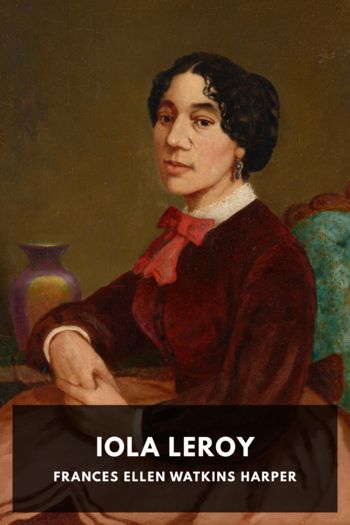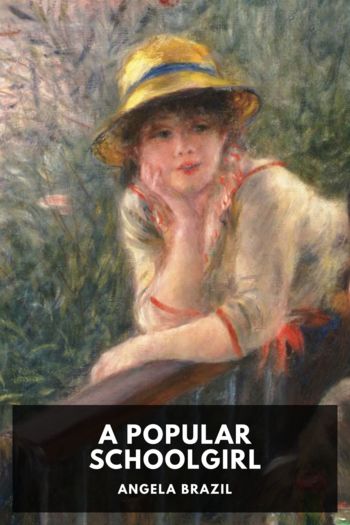Iola Leroy, Frances Ellen Watkins Harper [read aloud books .txt] 📗

- Author: Frances Ellen Watkins Harper
Book online «Iola Leroy, Frances Ellen Watkins Harper [read aloud books .txt] 📗». Author Frances Ellen Watkins Harper
“Now, jes’ wait a bit, and don’t frustrate my mine. I seed day arter day Miss Anna war gettin’ weaker and thinner, an’ she looked so sweet and talked so putty, I thinks to myself, ‘you ain’t long for dis worl’.’ And she said to me one day, ‘Uncle Dan’el, when I’se gone, I want you to be good to your Marster Robert.’ An’ she looked so pale and weak I war almost ready to cry. I couldn’t help it. She hed allers bin mighty good to me. An’ I beliebs in praisin’ de bridge dat carries me ober. She said, ‘Uncle Dan’el, I wish you war free. Ef I had my way you shouldn’t serve anyone when I’m gone; but Mr. Thurston had eberything in his power when he made his will. I war tied hand and foot, and I couldn’t help it.’ In a little while she war gone—jis’ faded away like a flower. I belieb ef dere’s a saint in glory, Miss Anna’s dere.”
“Oh, I don’t take much stock in white folks’ religion,” said Robert, laughing carelessly.
“The way,” said Tom Anderson, “dat some of dese folks cut their cards yere, I think dey’ll be as sceece in hebben as hen’s teeth. I think wen some of dem preachers brings de Bible ’round an’ tells us ’bout mindin our marsters and not stealin’ dere tings, dat dey preach to please de white folks, an’ dey frows coleness ober de meetin’.”
“An’ I,” said Aunt Linda, “neber did belieb in dem Bible preachers. I yered one ob dem sayin’ wen he war dyin’, it war all dark wid him. An’ de way he treated his house-girl, pore thing, I don’t wonder dat it war dark wid him.”
“O, I guess,” said Robert, “that the Bible is all right, but some of these church folks don’t get the right hang of it.”
“May be dat’s so,” said Aunt Linda. “But I allers wanted to learn how to read. I once had a book, and tried to make out what war in it, but ebery time my mistus caught me wid a book in my hand, she used to whip my fingers. An’ I couldn’t see ef it war good for white folks, why it warn’t good for cullud folks.”
“Well,” said Tom Anderson, “I belieb in de good ole-time religion. But arter dese white folks is done fussin’ and beatin’ de cullud folks, I don’t want ’em to come talking religion to me. We used to hab on our place a real Guinea man, an’ once he made ole Marse mad, an’ he had him whipped. Old Marse war trying to break him in, but dat fellow war spunk to de backbone, an’ when he ’gin talkin’ to him ’bout savin’ his soul an’ gittin’ to hebbin, he tole him ef he went to hebbin an’ foun’ he war dare, he wouldn’t go in. He wouldn’t stay wid any such rascal as he war.”
“What became of him?” asked Robert.
“Oh, he died. But he had some quare notions ’bout religion. He thought dat when he died he would go back to his ole country. He allers kep’ his ole Guinea name.”
“What was it?”
“Potobombra. Do you know what he wanted Marster to do ’fore he died?” continued Anderson.
“No.”
“He wanted him to gib him his free papers.”
“Did he do it?”
“Ob course he did. As de poor fellow war dying an’ he couldn’t sell him in de oder world, he jis’ wrote him de papers to yumor him. He didn’t want to go back to Africa a slave. He thought if he did, his people would look down on him, an’ he wanted to go back a free man. He war orful weak when Marster brought him de free papers. He jis’ ris up in de bed, clutched dem in his han’s, smiled, an’ gasped out, ‘I’se free at las’; an’ fell back on de pillar, an’ he war gone. Oh, but he war spunky. De oberseers, arter dey foun’ out who he war, gin’rally gabe him a wide birth. I specs his father war some ole Guinea king.”
“Well, chillen,” said Uncle Daniel, “we’s kept up dis meeting long enough. We’d better go home, and not all go one way, cause de patrollers might git us all inter trouble, an’ we must try to slip home by hook or crook.”
“An’ when we meet again, Uncle Daniel can finish his story, an’ be ready to go with us,” said Robert.
“I wish,” said Tom Anderson, “he would go wid us, de wuss kind.”
III Uncle Daniel’s StoryThe Union had snapped asunder because it lacked the cohesion of justice, and the Nation was destined to pass through the crucible of disaster and defeat, till she was ready to clasp hands with the negro and march abreast with him to freedom and victory.
The Union army was encamping a few miles from C⸺, in North Carolina. Robert, being well posted on the condition of affairs, had stealthily contrived to call a meeting in Uncle Daniel’s cabin. Uncle Daniel’s wife had gone to bed as a sick sister, and they held a prayer-meeting by her bedside. It was a little risky, but as Mr. Thurston did not encourage the visits of the patrollers, and heartily detested having them prying into his cabins, there was not much danger of molestation.
“Well, Uncle Daniel, we want to hear your story, and see if you have made up your mind to go with us,” said Robert, after he had been seated a few minutes in Uncle Daniel’s cabin.
“No, chillen, I’ve no objection to finishin’ my story, but I ain’t made up my mind to leave the place till Marse Robert gits back.”
“You were telling us about Marse Robert’s mother. How did you get along after she died?”
“Arter she war gone, ole Marster’s folks come to look arter things. But eberything war lef’ to Marse Robert, an’ he wouldn’t do widout





Comments (0)